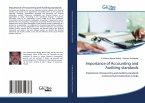It is in the presence of all these particularities and in particular the various criticisms addressed to audit professionals in recent times and the standard-setting work undertaken by international audit bodies to deal with these situations that it seemed appropriate to raise the issue of examining the responses provided by international standard-setting bodies in terms of improving audit quality. Indeed, the new audit planning standards increasingly insist on taking into account strategic risks, the process of assessing corporate risks, the evaluation of significant risks and the evolution of integrated management systems. However, the proposed audit approach is rather oriented towards the particularities of large companies. A fundamental question remains unresolved until now is: How to apply the principles and procedures laid down by auditing standards when the auditor plans and implements audit procedures to meet the specific context of small and medium-sized Tunisian companies?








